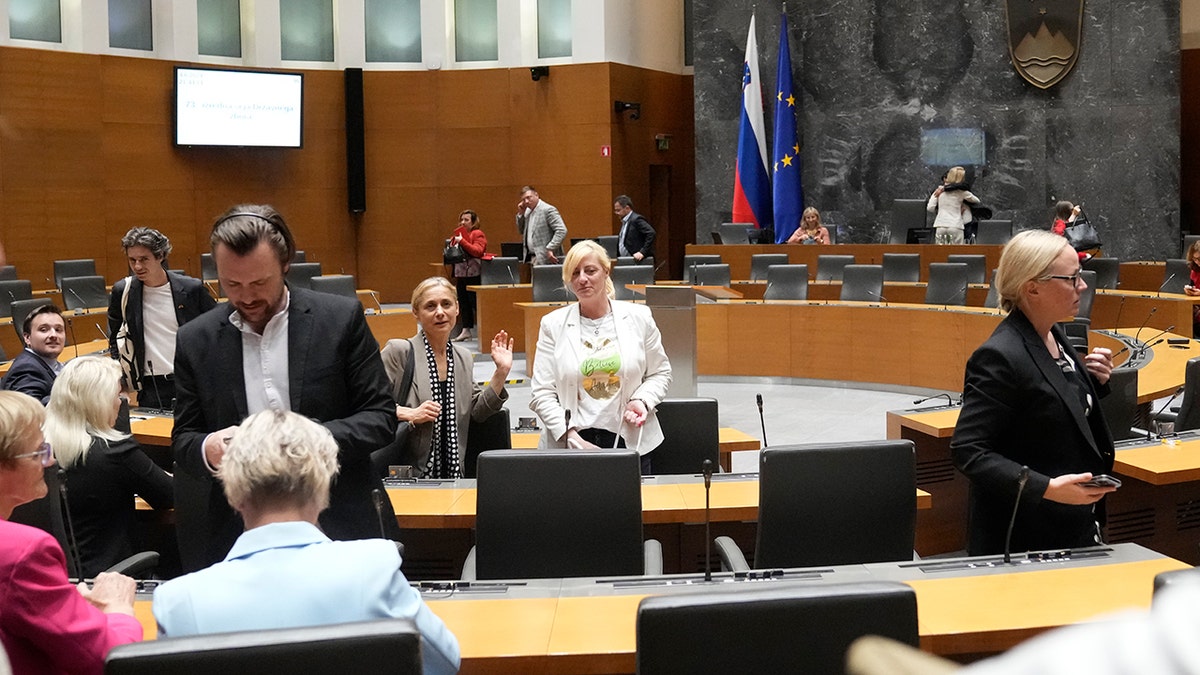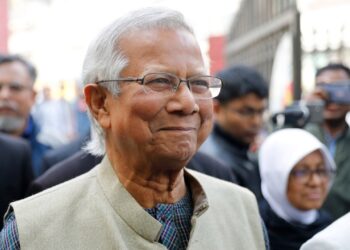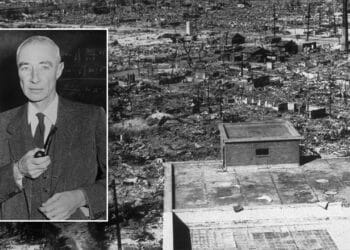Slovenia recognized a Palestinian state on Tuesday after its parliament voted overwhelmingly in favor of the move, following in the recent steps of three other European countries.
Slovenia’s government endorsed a motion last week to recognize a Palestinian state, and sent the proposal to the parliament for final approval, which was needed for the decision to take effect.
SLOVENIA’S GOVERNMENT ENDORSES RECOGNITION OF A PALESTINIAN STATE, SENDS TO PARLIAMENT FOR APPROVAL
Lawmakers on Tuesday voted with 52 in favor and no one against recognition in the 90-seat parliament. The remaining lawmakers were not present for the vote.
“Dear people of Palestine, today’s final decision of Slovenia is a message of hope and peace,” Slovenia’s Foreign Minister Tanja Fajon said on the social media platform X. “We believe that only a two-state solution can lead to a lasting peace in the #MiddleEast. Slovenia will tirelessly continue to work on the security of both nations, Palestinians and Israelis.”

Members of the Slovenian Parliament leave the hall after their vote in Ljubljana, Slovenia, Tuesday, June 4, 2024. Slovenia recognized a Palestinian state on Tuesday after its parliament voted overwhelmingly in favor of the move, following in the recent steps of three other European countries. (AP Photo/Darko Bandic)
Slovenia’s decision came days after Spain, Norway and Ireland recognized a Palestinian state, a move that was condemned by Israel.
Previously, only seven members of the 27-nation European Union officially recognized a Palestinian state. Five of them are former East bloc countries that announced recognition in 1988, as did Cyprus, before joining the EU. Sweden’s recognition came in 2014.
“We started talking with our allies about the recognition of Palestine in February this year,” Prime Minister Robert Golob told lawmakers before Tuesday’s vote. “At the time, the assessment was — the time is not yet ripe … we warned that we, Europe, have a … duty to act.”
The ruling coalition led by Golob holds a comfortable majority in Slovenia’s assembly and the vote was expected to be a formality.
Golob also evoked Slovenia’s independence from the former Yugoslavia in 1991 in his remarks to parliament.
“We Slovenians have dreamed of this right for 1,000 years. We got it 33 years ago,” Golob said. “Unfortunately, the Palestinian nation has not yet received this right.”
Slovenia’s main opposition party, the Slovenian Democratic Party, opposes the recognition. The right-wing party has demanded a referendum on the issue that would delay the vote, but on Tuesday withdrew the bid before again filing another one that was rejected by parliament.
Slovenia first began the recognition process in early May, but said it would wait until the situation in the ongoing Israel-Hamas war in Gaza improved. Golob has explained he was speeding up the process in reaction to Israel’s latest attacks on the southern Gaza city of Rafah, which have caused more than 1 million Palestinians to flee.
CLICK HERE TO GET THE FOX NEWS APP
The war was triggered by the Oct. 7 Hamas-led attack in which militants stormed across the Gaza border into southern Israel, killing 1,200 people and taking about 250 hostage. Israel’s air and land attacks have since killed more than 36,000 Palestinians, according to Gaza’s Health Ministry, which doesn’t distinguish between combatants and civilians.
More than 140 countries recognize a Palestinian state — more than two-thirds of the United Nations.
(this story has not been edited by TSA Mag staff and is published from a syndicated feed.)
Slovenia recognized a Palestinian state on Tuesday after its parliament voted overwhelmingly in favor of the move, following in the recent steps of three other European countries.
Slovenia’s government endorsed a motion last week to recognize a Palestinian state, and sent the proposal to the parliament for final approval, which was needed for the decision to take effect.
SLOVENIA’S GOVERNMENT ENDORSES RECOGNITION OF A PALESTINIAN STATE, SENDS TO PARLIAMENT FOR APPROVAL
Lawmakers on Tuesday voted with 52 in favor and no one against recognition in the 90-seat parliament. The remaining lawmakers were not present for the vote.
“Dear people of Palestine, today’s final decision of Slovenia is a message of hope and peace,” Slovenia’s Foreign Minister Tanja Fajon said on the social media platform X. “We believe that only a two-state solution can lead to a lasting peace in the #MiddleEast. Slovenia will tirelessly continue to work on the security of both nations, Palestinians and Israelis.”

Members of the Slovenian Parliament leave the hall after their vote in Ljubljana, Slovenia, Tuesday, June 4, 2024. Slovenia recognized a Palestinian state on Tuesday after its parliament voted overwhelmingly in favor of the move, following in the recent steps of three other European countries. (AP Photo/Darko Bandic)
Slovenia’s decision came days after Spain, Norway and Ireland recognized a Palestinian state, a move that was condemned by Israel.
Previously, only seven members of the 27-nation European Union officially recognized a Palestinian state. Five of them are former East bloc countries that announced recognition in 1988, as did Cyprus, before joining the EU. Sweden’s recognition came in 2014.
“We started talking with our allies about the recognition of Palestine in February this year,” Prime Minister Robert Golob told lawmakers before Tuesday’s vote. “At the time, the assessment was — the time is not yet ripe … we warned that we, Europe, have a … duty to act.”
The ruling coalition led by Golob holds a comfortable majority in Slovenia’s assembly and the vote was expected to be a formality.
Golob also evoked Slovenia’s independence from the former Yugoslavia in 1991 in his remarks to parliament.
“We Slovenians have dreamed of this right for 1,000 years. We got it 33 years ago,” Golob said. “Unfortunately, the Palestinian nation has not yet received this right.”
Slovenia’s main opposition party, the Slovenian Democratic Party, opposes the recognition. The right-wing party has demanded a referendum on the issue that would delay the vote, but on Tuesday withdrew the bid before again filing another one that was rejected by parliament.
Slovenia first began the recognition process in early May, but said it would wait until the situation in the ongoing Israel-Hamas war in Gaza improved. Golob has explained he was speeding up the process in reaction to Israel’s latest attacks on the southern Gaza city of Rafah, which have caused more than 1 million Palestinians to flee.
CLICK HERE TO GET THE FOX NEWS APP
The war was triggered by the Oct. 7 Hamas-led attack in which militants stormed across the Gaza border into southern Israel, killing 1,200 people and taking about 250 hostage. Israel’s air and land attacks have since killed more than 36,000 Palestinians, according to Gaza’s Health Ministry, which doesn’t distinguish between combatants and civilians.
More than 140 countries recognize a Palestinian state — more than two-thirds of the United Nations.
















